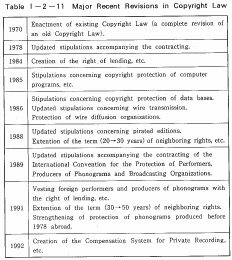| Home > Policy > White Paper, Notice, Announcement > White Paper > JAPANESE GOVERNMENT POLICIES IN EDUCATION, SCIENCE AND CULTURE 1993 > CHAPTER 2 �7 1 | ||
The copyright system contributes to the development of culture within the country by protecting the rights of creators and authors (novels, pictures, music, movies, computer programs and so on), by protecting neighboring rights (performers, producers of phonograms, broadcasting organizations and wire relay broadcasting) and by assisting in the creation of new works. Japan's copyright system began with the enactment of the Copyright Law in 1899. This Law was totally revised in 1970 and remains in effect to the present time.
As for the copyright system, multilateral conventions have been concluded to assure copyright protection in cases of international exploitation of works, and Japan has acceded to all of the major conventions.
Taking into consideration of great diversification of the forms of using works due to technological innovations, changes in socio-economic conditions and international trends on copyright systems, it is necessary to maintain appropriate relations between the owners of copyrights and the users of their work.
In light of these points, the Agency for Cultural Affairs has been endeavoring to improve the copyright system to meet social needs. Especially during the past ten years, the Copyright Law was amended seven times to deal with issues such as the creation of the right of rental, stipulations concerning copyright protection of computer programs and data bases and protection of wire broadcast organizations. At an extraordinary session of the Diet in 1992, the Copyright Law was partially amended to introduce a "Compensation System for Private Audio and Audiovisual Recordings". Under the new system, those who had made recordings at home or at other private facilities, which were previously not required to obtain authorization and free of charge, are obligated to financially compensate the copyright holder, if the recording is made with digital recording equipment on a digital recording medium. This system was implemented as of June l, 1993 (Table I 2-11).

| Back to Top | MEXT HOME |